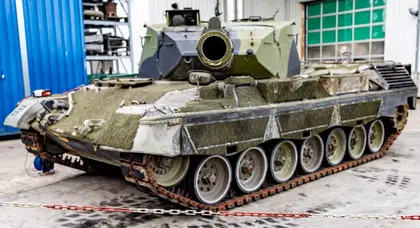Germany finally bowed to international pressure to send German Leopard 2 tanks to Ukraine in January after resisting the calls “for fear of escalating the conflict.” One of the driving forces behind the eventual decision to provide the tanks was Armin Papperger, the Head of the Rheinmetall defense manufacturing group.
JOIN US ON TELEGRAM
Follow our coverage of the war on the @Kyivpost_official.
He had earlier whipped up a storm in Russia and Germany by offering to open a factory to build its new Panther KF51 main battle tank in Ukraine. Dmitry Medvedev, deputy head of Russia’s security council, responded by issuing a threat that any such move would be welcomed with “salutes” from Kalibr missiles.
- Read the most current war in ukraine update from the Kyiv Post's daily news updates today.
- Look at the latest Ukraine news that was released today.
In May Rheinmetall revealed it had signed a strategic partnership with the Ukrainian state-owned defense contractor Ukroboronprom that was intended to “build a bridge between Rheinmetall and the existing state defense industry in Ukraine.”
The announcement went on to say that the venture would initially focus on repairing its Leopard 2 tanks, which are produced jointly with Krauss-Maffei Wegmann, as well as other military vehicles which are returned from the battlefield. It went on to say that sometime in the future, the partnership would also make “select Rheinmetall products.”
On Friday, July 28 Papperger told Germany’s Spiegel that Rheinmetall was “…currently already training Ukrainians in Germany for this job [repair of Leopard 2],” with plans to open the repair center in late summer.

Lithuania to Invest in Ukraine’s Palianytsia Hybrid Missile-Drone
Berlin has supplied around 20 Leopard 2A6 tanks to Kyiv while a consortium of eight other countries, including Poland, Canada, Portugal, Spain, Norway, Denmark, and the Netherlands have provided several dozen of the older Leopard 1 main battle tanks.
Rheinmetall set up a maintenance and logistics hub in Lithuania in June 2022 announced it would establish another in Romania in April this year, to provide support to NATO vehicles in the Baltic states as well as those being supplied to Ukraine.
The setting up of this repair center in Ukraine will reduce the distances that damaged tanks and other vehicles will have to be transported, despite Russia’s earlier threats to attack any such facility.
Two weeks ago, Rheinmetall announced that it had received new contracts from Berlin for the provision of military vehicles, weapons and munitions worth almost €6 billion ($6.6 billion).
You can also highlight the text and press Ctrl + Enter






